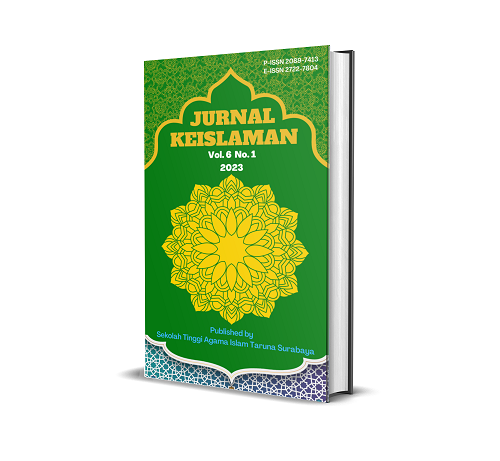Implementasi Kegiatan Keagamaan Dalam Meningkatkan Kecerdasan Spiritual Siswa
Abstract
Religion is a very sacred and sensitive matter, every regulation and religious activity organized by the school will be more fully complied with and the implementation will be more effective. The implementation of religious activities in schools is often associated with efforts to build the character and spirituality of students so that they become more religious and Islamic. This study was conducted through field research using a descriptive qualitative approach at MTs Darul Hasan Lajing Arosbaya Bangkalan. The results of the research findings explained that the dhuha and midday prayer programs in congregation are implementation practices that are proven to build an attitude of love for God, discipline, and istiqomah in students at school. The love for Allah SWT is realized by the more active the students carry out ritual activities both sunnah and obligatory. Meanwhile, disciplined behavior is shown by the more orderly and diligent participation of students in learning and religious activities both at school and in the community. This discipline brings istiqomah behavior, tawadu', cooperation, and mutual respect between friends, and cares more about the surrounding environment. This change in behavior is a real portrait of lifelong education that emphasizes the spiritual transformation of students.References
Afifudin, Metodelogi Penelitian Kualitatif . Bandung: CV Pustaka Setia. 2009.
Amin, Saifuddin. Etika Peserta Didik. Yogyakarta: CV Budi Utama, Cet. II, 2019.
Anis choiriah. “ Pengaruh Kecerdasan Emosional, Kecerdasan Intelektual, Kecerdasan Spiritual dan Etika Profesi terhadap Kinerja Auditor Dalam Kantor Akuntan Publik†Fakultas ekonomi Universitas negeri malang. Jurnal akuntansi. Vol 1. No 1( 2013) 7.
Arifin, Muh. Luqman “ upaya penumbuhan kecerdasan spiritual siswa sekolah dasar terpadu putra harapan purwokertoâ€, jurnal Edudeena, Vol 3 ( januari, 2019) 38.
Atika fitriani, Eka Yunarti, “ Upaya guru Pendidikan Agama Islam dalam Menumbuhkan Kecerdasan Spiritual siswaâ€, Belajea, Vol. 3, No. 02, (2018) 174.
Buzan, Barry dan Ole Waever. Regions and Powers: The Structure of International Security. Cambridge University Press. 2003.
Daulay, Haidar Putra, Pendidikan Islam Dalam System Pendidikan Nasional Di Indonesia. Jakarta: Kencana, 2012, Cet. I.
Gunawan, Heri . Pendidikan Karakter Konsep dan Impementasi . Bandung : Alfabeta, 2012.
Gunawan, Imam. Metodelogi Penelitian Kualitatif . Jakarta: PT Bumi Aksara, 2014.
Jurnal yang ditulis Luqman Arifin, Sutriyono, “Upaya Penumbuhan Kecerdasan Spiritual Siswa Di Sekolah Dasar Terpadu Putra Harapan Purwokertoâ€, Jurnal Edudeena, vol. 3 No. 1 (januari 2019) 38.
Kadek Agus Santika Putra, Made Yenni Latrini. “Pengaruh Kecerdasan Intelektual, Kecerdasan Emosional, Kecerdasan Spiritual, Komitmen Organisasi Terhadap kinerja Auditorâ€, E-Jurnal Akuntansi Universitas Udayana Vol.17.2. November (2016) 1116.
Kuswana, Wowo Sunaryo. Taksonomi Berpikir. Bandung: PT Remaja Rosdakarya, 2011.
Nasution. Metode Research (Penelitian Ilmiah). Jakarta: Bumi Aksara. 2009.
Sugiyono, Metode Peneletian Pendidikan. Bandung: Alfabeta, 2016.
Suharsimi Arikunto, Prosedur Penelitian Suatu Pendekatan Praktek .Jakarta: Rineka Cipta,1992.
Copyright (c) 2023 Imam Syafi'i, Mardiyah Mardiyah

This work is licensed under a Creative Commons Attribution-ShareAlike 4.0 International License.
Authors who publish with this journal agree to the following terms:
- Authors retain copyright and grant the journal right of first publication with the work simultaneously licensed under a Creative Commons Attribution-ShareAlike that allows others to share the work with an acknowledgement of the work's authorship and initial publication in this journal.
- Authors are able to enter into separate, additional contractual arrangements for the non-exclusive distribution of the journal's published version of the work (e.g., post it to an institutional repository or publish it in a book), with an acknowledgement of its initial publication in this journal.
- Authors are permitted and encouraged to post their work online (e.g., in institutional repositories or on their website) prior to and during the submission process, as it can lead to productive exchanges, as well as earlier and greater citation of published work (See The Effect of Open Access).






















